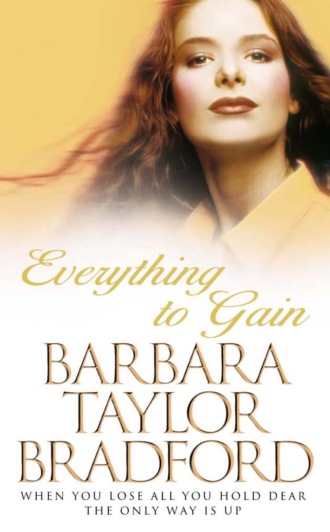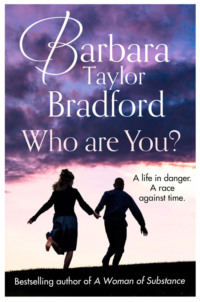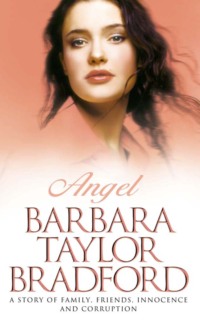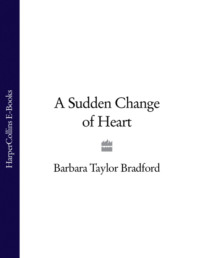
Полная версия
Everything to Gain

BARBARA TAYLOR BRADFORD
Everything to Gain

Copyright
Published by HarperCollinsPublishers Ltd 1 London Bridge Street London SE1 9GF
www.harpercollins.co.uk
First published in Great Britain by HarperCollinsPublishers 1994
Copyright © Barbara Taylor Bradford 1994
Barbara Taylor Bradford asserts the moral right to be identified as the author of this work
This novel is entirely a work of fiction. The names, characters and incidents portrayed in it are the work of the author’s imagination. Any resemblance to actual persons, living or dead, events or localities is entirely coincidental.
All rights reserved under International and Pan-American Copyright Conventions. By payment of the required fees, you have been granted the non-exclusive, non-transferable right to access and read the text of this e-book on-screen. No part of this text may be reproduced, transmitted, downloaded, decompiled, reverse engineered, or stored in or introduced into any information storage and retrieval system, in any form or by any means, whether electronic or mechanical, now known or hereinafter invented, without the express written permission of HarperCollins e-books.
HarperCollinsPublishers has made every reasonable effort to ensure that any picture content and written content in this ebook has been included or removed in accordance with the contractual and technological constraints in operation at the time of publication.
Ebook Edition © SEPTEMBER 2012 ISBN:9780007330836
Version: 2017-11-16
Dedication
For Bob, ever true blue, with my love
Contents
Cover
Title Page
Copyright
Dedication
Prologue
PART ONE: Indian Meadows
One
Two
Three
Four
Five
Six
Seven
Eight
Nine
Ten
PART TWO: Kilgram Chase
Eleven
Twelve
Thirteen
Fourteen
Fifteen
Sixteen
Seventeen
PART THREE: New York City
Eighteen
Nineteen
Twenty
Twenty-one
Twenty-two
PART FOUR: Indian Meadows
Twenty-three
Twenty-four
Twenty-five
Twenty-six
Twenty-seven
PART FIVE: Kilgram Chase
Twenty-eight
Twenty-nine
Thirty
Thirty-one
Thirty-two
PART SIX: Indian Meadows
Thirty-three
Thirty-four
Thirty-five
Thirty-six
Thirty-seven
Thirty-eight
Thirty-nine
Forty
Forty-one
Forty-two
About the Author
By the Same Author
About the Publisher
Prologue
Connecticut August 1993
I have been alone for so long now, it is almost impossible for me to think in terms of living with another person again. But that is what Richard wants me to do. To live with him.
When he asked me, last night, to marry him, I told him I could not. Undaunted by my answer, and bravely, as is his way, he suggested we move in together. A sort of trial marriage, he said, with no strings, no commitment necessary on my part. ‘I’ll take my chances, Mal,’ he said with a small, wry smile, his dark eyes anxiously holding mine.
Yet even this idea seems as out of the question to me now, this morning, as it did last night. I suppose, if I am scrupulously honest with myself, I fear the intimacy of living with another human being. It is not so much the sexual intimacy that appals me but the physical closeness on a day-to-day basis, the emotional bonding that weaves two people together and makes them part of each other. I am convinced I cannot handle this, and the more I think about it the more I am coming to understand truly my reaction to Richard’s suggestion.
I am afraid. Afraid to make a commitment … afraid of caring for him too deeply … afraid of becoming too attached to him … perhaps even of falling in love with him, if, indeed, I am capable of this, capable of such a strong emotion.
Fear has paralysed me emotionally for a number of years. I am well aware of that, and so I have created a life for myself, a life alone; this has always seemed so much safer. Brick by brick by brick I have erected a wall around myself, a wall built on the foundations of my business, my work and my career. I have done this in order to protect myself, to insulate myself from life; work has been my strong citadel for such a long time now, and it has given me exactly what I have needed these few years.
Once I had so much. I had everything a woman could possibly want. And I lost it all.
For the past five years, since that fateful winter of 1988, I have lived with pain and heartache and grief. I have lived with a sorrow that has been, and still is, unendurable. And yet I have endured. I have gone on; I have fought my way up out of a terrible darkness and despair when I had hardly any strength left and when I had lost even the will to live. I have managed, somehow, to survive.
And I taught myself to live alone, have grown used to doing so, and I’m not sure that I can ever share myself again, as I once did, certainly not in the way I did in the past, in that other life which I once had.
But this is exactly what Richard is asking of me. He wants me to share my life with him and therefore to share myself. He is a good man. I don’t think there is one better anywhere on this earth, and any woman would be lucky to have him. But I am not any woman. I have gone through far too much, have been scarred for ever, my soul damaged irretrievably, beyond repair, so I believe. And I’m fully aware that I can never be the kind of woman he deserves, a woman who can give him her all, a woman without a past, with no heavy baggage, no burdens or sorrows weighing her down, such as I have.
The easiest thing for me, emotional cripple that I have become, would be to send Richard Markson away, to tell him no much more firmly than I did last night, and never see him again. Yet I cannot … something holds me back, prevents me from saying those words. It is Richard himself, of course, I realize that. In my own way, I do have certain feelings for him, and have come to rely on him lately, perhaps more than I care to admit.
Richard came into my life quite by accident about a year ago, not long after he rented a house near mine in this pastoral corner of north-western Connecticut, just above Sharon near Wonopankook Lake and Mudge Pond, close to the Massachusetts border. I have always called these western highlands of Connecticut God’s own country, and so I was somewhat startled when he used exactly those words to describe his appreciation of this magnificently beautiful part of the world.
I liked Richard the moment he walked into my house. On that winter’s evening, over supper in my kitchen, I was convinced it was my friend Sarah Thomas with whom Richard was taken. It was not until a few weeks later that he made it perfectly clear to me I was the object of his interest, the one he wished to know better.
Wary, I held him at bay for a long time; then slowly, cautiously, I allowed him to enter a small corner of my life. Yet in many ways I’ve withheld much of myself. So it’s not without reason that I was stunned last night when he proposed to me. I promised to give him an answer today.
My eye caught the top of the New York Times which lay on my desk, and I read the date: Monday, August 9, 1993. I wondered if he would remember this date later, recall it as the day I rejected him, just as I remembered so many dates myself … markers along the path of my life that brought back so many memories when they rolled around every year.
On the spur of the moment, I reached for the phone, wanting to get it over with, and then almost instantly my hand fell away. There was no point dialling his apartment in Manhattan, since I was not sure how to couch the words I knew must be said. I didn’t want to hurt him unduly; I must be diplomatic.
Suddenly irritated with myself, I sighed under my breath, impatiently pushed back my chair and went to turn on the air-conditioner. It was unusually humid this morning, the air heavy and oppressive in my office here at the back of the house. My skin was clammy and I felt stifled, claustrophobic all of a sudden.
Returning to my desk, I sat down and stared into space, my thoughts continuing to focus on Richard. Last night he’d said I was too young to lead such a solitary existence. There’s truth in this, I suppose. After all, I am only thirty-eight years old. Still, there are days when I feel like an old woman of eighty, older than that even. I realize this is because of the things which have happened to me, plus my new-found knowledge about life and people. Certainly I’ve learned a lot about their insensitivity and selfishness, their callousness and indifference. I’ve learned about evil too, first-hand; yes, and even about good. There are some good people in this world, those who are kind and concerned and compassionate, but not many, not really. I have come to understand only too well that, for the most part, we are entirely alone with our troubles and pain. I suspect I’ve become something of a cynic these days, as well as much wiser, more self-protective and self-reliant than I ever was before.
A few weeks ago, I railed on about the doers of evil who inhabit this planet, and Richard listened attentively, as he always does. When I finished, and discovered I was on the verge of unexpected tears, he joined me on the sofa, simply took my hand in his and held it tightly. We sat together like that for a long time surrounded by the silence, until he said finally, ever so quietly, ‘Don’t try to understand the nature of evil, or analyse it, Mal. It’s a mystery, one nobody has ever been able to fathom. Evil has touched your life, more so than it’s touched most people’s. You’ve been through hell, and I certainly have no proper words with which to console you. Anyway, words are empty, cold comfort at best. I just want you to know that I’m always there for you whenever you need me. I’m your friend, Mal.’
I know I will always be grateful to him, not only for expressing those lovely sentiments that particular day, but because he did not attempt to placate me with platitudes, those meaningless words the well-meaning tend to offer when confronted with another person’s pain or anger or despair. Also, I must admit, I admire Richard Markson. He is a decent human being, a man of integrity and compassion, qualities that mean a great deal to me. Although he has never been married, he has not passed through this life totally unscathed, that I know. He is thirty-nine, a year older than I, and now it strikes me, and quite forcibly, how ready he is to make a commitment, to embark on a long-term relationship, is willing to accept everything this means. But am I? Ambivalent, uncertain, wary, scared, caught on an eddying tide of fears and deep-rooted problems, I feel completely helpless this morning, unable to think with clarity.
I snapped my eyes shut, leaned forward and dropped my head on the desk, realizing, as I did, that I was spiralling down into a cold funk. There was no way I could make that call to Richard, as I had promised I would. Very simply, I had nothing to say to him, no answer to give him.
The shrill ring of the telephone a few moments later brought me upright in my chair with a start, and I reached for the receiver and said, ‘Hello?’
‘Mallory?’
‘Yes.’
‘It’s me. Richard.’
‘I know.’
‘Mal, I have to go out of town. On an assignment.’
‘Oh,’ I said, surprised by his announcement. ‘This is very sudden, isn’t it?’
‘Yes. It just came up a short while ago. The magazine’s sending me to Bosnia. I’m leaving immediately. This United Nations–NATO situation is turning out to be something of a fiasco. So off I’m going to —’
‘But you don’t usually cover things like this, do you?’ I cut in, ‘I mean, you don’t cover wars.’
‘Nor am I doing so now. Not really. I’m going to be writing one of my special “think” pieces, based on the kind of things we’ve all been saying about the wholesale carnage going on over there, the dithering of the Western leaders and the terrible indifference the world is showing to such human suffering.’ He paused, then murmured, ‘It’s a replay of everything that happened in Nazi Germany sixty years ago …’ His quiet, concerned voice trailed off into silence.
‘It’s the most hideous situation!’ I exclaimed, my voice rising. ‘We’re no more civilized now than we were in the tenth century! Nothing’s changed, we’ve learned nothing. Man is rotten. Evil.’
‘I know that, Mal,’ he answered, sighing imperceptibly.
Striving to adopt a more normal tone, I said, ‘And so you’re leaving today?’
‘I’ll be heading for Kennedy in a couple of hours.’ There was a little pause, and then he said, ‘Mal?’
‘Yes, Richard?’
‘Do you have an answer for me?’
I was silent for a moment or two. Eventually, clearing my throat, I said, ‘No, I’m afraid I don’t. I’m sorry, Richard, I need time. I told you that …’ Now it was my turn to let my voice fade away.
Richard did not say a word.
I held the phone tightly, waiting, wondering how he was going to take my negative attitude.
Suddenly, he spoke. ‘Perhaps when I get back from Bosnia,’ he said in a firm, strong voice, ‘you’ll have good news for me, tell me what I want to hear. You will, won’t you?’
‘When will you be back?’ I asked, not rising to the bait.
‘In a week to ten days.’
‘Be careful, Richard. It’s dangerous where you’re going.’
That light careless laugh I had grown to know echoed down the wire. ‘I don’t aim to die, if that’s what you’re getting at. That’s not part of my destiny.’
‘Nevertheless, just be careful.’
‘I will. And take care of yourself, Mal. So long.’
He hung up before I could say goodbye.
After a moment or two I walked out of my office, across the back hall and out into the garden.
I took the stone-paved path that led across the vast lawns at the back of the house, walking rapidly until I came to the ridge overlooking part of my property and the valley far beyond. Hills darkly green with lush and splendid trees soared high above this valley, giving it some shelter from the elements in the harsh winter months. The two small houses nestling in the bed of the valley, always so forlorn in bad weather, now looked cool and inviting with their white-painted shingles and dark rooftops, their gardens bright with vivid colour.
Presently I shifted my gaze, let it rest just below me. Here, at the bottom of verdant lawns sloping away from the ridge where I stood, the horses grazed contentedly in the long meadow. To the left of them, and adding to this bucolic scene, were the old barns, freshly painted dark red with white trim. To the right of the long meadow, the pond, calm and glassy as a mirror, shimmered in the sun; a family of Canada geese swam, one after the other, in a straight line across its dark surface, where water lilies, waxy and pale pink, floated in profusion.
After a short while my eyes wandered, my glance sweeping over the resplendent rose bushes, luxuriant and in full flower, then moved on to survey my vegetable garden behind its white picket fence, the cutting garden bursting with perennials in a galaxy of the gayest hues. Everything blooms so well here; how beautiful the land is, so rich, so ripe with life.
I lifted my head and looked up at the sky. It was the brightest, most piercing of blues, banked high with pure white flossy clouds, and dazzling. I blinked several times against the light and then I realized, suddenly, that I was crying.
As the tears ran down my cheeks unchecked, I thought of Richard’s words a short while before. ‘I don’t aim to die,’ he had said, almost dismissively.
I shivered in the sunlight, unexpectedly cold in the sultry air. No one ever knows what life holds, I thought, what destiny has in store. I understand that better than anyone.
Five years fell away.
I stepped back into the past, into the summer of 1988, a summer which would be etched on my heart for ever.
One
Connecticut July 1988
I awakened with a sudden start, as though someone had touched my shoulder, and I half expected to see Andrew standing over me as I blinked in the dim room. But he was not there. How could he be. He was in Chicago on business and I was here in Connecticut.
Pulling the covers over me more securely, I slid further down into the bed, hoping to fall asleep again. I soon realized there was no chance of that, since my mind had already started to race. Andrew and I had quarrelled earlier in the week and that silly little row, over something so petty I could scarcely bear to think about it now, still hovered between us.
I should have swallowed my pride and called him last night, I admonished myself. I had thought about it, but I had not done so. He hadn’t phoned me either, as was his custom normally when he was away, and I was worried things would get blown out of all proportion; then our weekend together, which I had been so looking forward to, would be spoiled.
I’ll make it right when he gets here tomorrow, I resolved; I’ll apologize, even though it really wasn’t my fault. I hated to have rifts with anyone I loved; it has always been that way with me.
It soon became apparent I wasn’t going to fall asleep again this morning, and, restlessly, I slipped out of bed and went to the window. Raising the blind, I peered out, wondering what kind of day it was going to be.
A band of clear, crystalline light was edging its way along the rim of the distant horizon. The sky above it was still ashy, cold and remote, tinged slightly with green at this early hour just before dawn broke. I shivered and reached for my cotton robe. It was cool in the bedroom, almost frosty, with the air-conditioner set at sixty degrees, where I’d positioned it last night in an effort to counteract the intense July heat. I flicked it off as I left the bedroom and headed along the upstairs hallway towards the staircase.
It was dim and shadowy downstairs and smelled faintly of apples and cinnamon and beeswax and full-blown summer roses, smells which I loved and invariably associated with the country. I turned on several lamps as I moved through the silent, slumbering house, and went into the kitchen; once I had put on the coffee I made my way to the sunroom.
Unlocking the French windows, I stepped outside onto the wide, paved terrace which surrounded the house and saw that the sky had already undergone a vast change. I caught my breath, marvelling as I always did at the extraordinary morning light, a light peculiar to these northern Connecticut climes. It was luminous, eerily beautiful, and it appeared to emanate from some secret source far, far below the horizon.
There were no skies like this anywhere in the world, as far as I knew, except, of course, for Yorkshire; I have come across some truly spectacular skies there, most especially on the moors.
Light has always fascinated me, perhaps because I am a painter by avocation and have a tendency to look at nature through an artist’s eyes. I remember the first time I ever saw a painting by Turner, one of his masterpieces hanging in the Tate Gallery in London. I stood in front of it for a full hour, totally riveted, marvelling at the incandescent light that gave the picture its breathtaking beauty. But then capturing light on canvas so brilliantly, and with such uncanny precision, was part of Turner’s great genius.
I don’t have that kind of gift, I’m afraid; I’m merely a talented amateur who paints for pleasure. Nonetheless, there are times when I wish I could re-create a Connecticut sky in one of my paintings, get it just right, just once, and this morning was one of those times. But I knew, deep down, that I would never be capable of doing it.
After lingering for a few minutes longer on the terrace outside the sunroom, I turned and walked around the house, heading for the back. Heavy dew clung to the grass and I lifted my nightgown and robe as I walked across the lawns, not wishing to get them drenched.
The light was changing yet again.
By the time I reached the ridge overlooking the valley, the sky above me was suffused with a pale, silvery radiance; the bleak, grey remnants of the night were finally obliterated.
Sitting down on the wrought-iron seat under the apple tree, I leaned back and relaxed. I love this time of day, just before the world awakens, when everything is so quiet, so still I might be the only person alive on this planet.
I closed my eyes momentarily, listening.
There was no sound of any kind, nothing stirred; not a leaf nor a blade of grass moved. The birds were silent, sleeping soundly in the trees, and the stillness around me was like a balm. As I sat there, drifting, thinking of nothing in particular, my anxiety about Andrew began to slip slowly away.
I knew with absolute certainty that everything would be all right between us once he arrived and we made up; it always was whenever there had been a bit of friction. There was no reason why this time should be different. One of the marvellous things about Andrew was his ability to put events of today and yesterday behind him, to look forward to tomorrow. It was not in his nature to harbour a grudge. He was far too big a man for that. Consequently, he quickly forgot our small, frequently silly quarrels and differences of opinion. We are much alike in that, he and I. Fortunately, we both have the ability to move forward optimistically.
I have been married to Andrew Keswick for ten years now. In fact, next week, on the twelfth of July, we will be celebrating our wedding anniversary.
We met in 1978 when I was twenty-three years old and he was thirty-one.
It was one of those proverbial whirlwind romances, except that ours, fortunately, did not fizzle out as so many usually do. Our relationship just grew better and better as time went on. That he swept me off my feet is a gross understatement. I fell blindly, madly, irrevocably in love with him. And he with me, as I was eventually to discover.
Andrew, who is English, had been living in New York for seven years when we met. He was considered to be one of the boy wonders of Madison Avenue, one of those brilliant advertising men, a natural in the business, who can make an advertising agency not only fabulously successful but incredibly famous as well, the kind that attracts a flock of prestigious multi-national clients. I worked in the copy department of the same agency, Blau, Ames, Braddock and Suskind, and at the time, despite my lowly position, I rather fancied myself as a writer of slick but convincing advertising copy.







